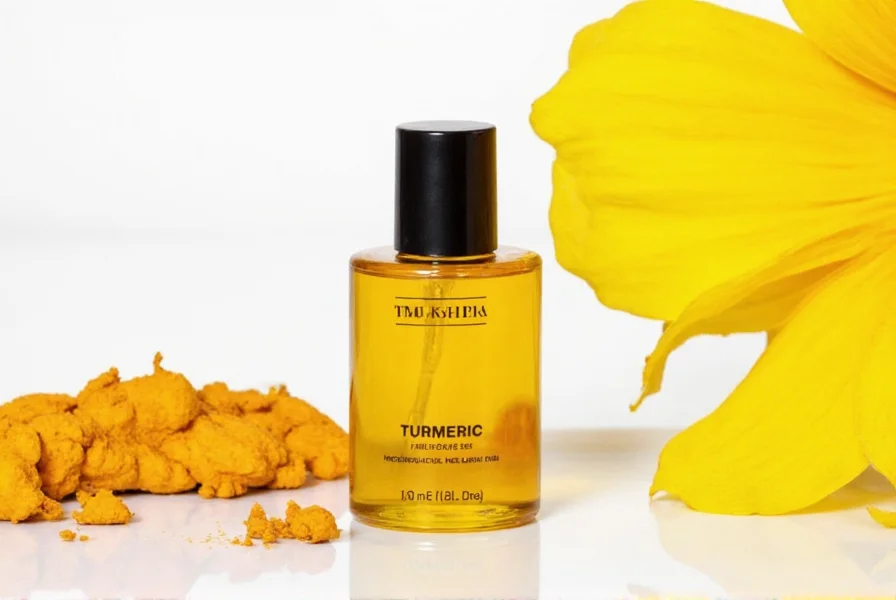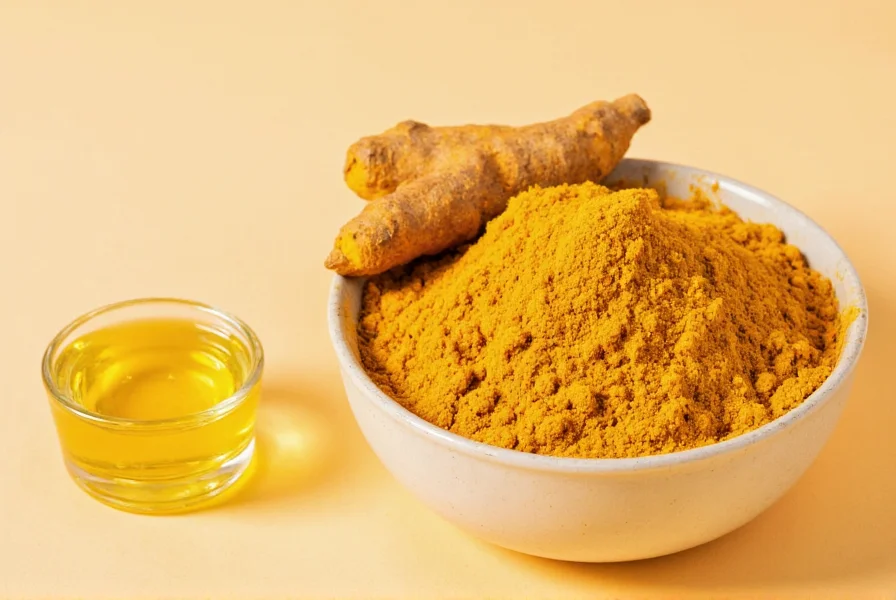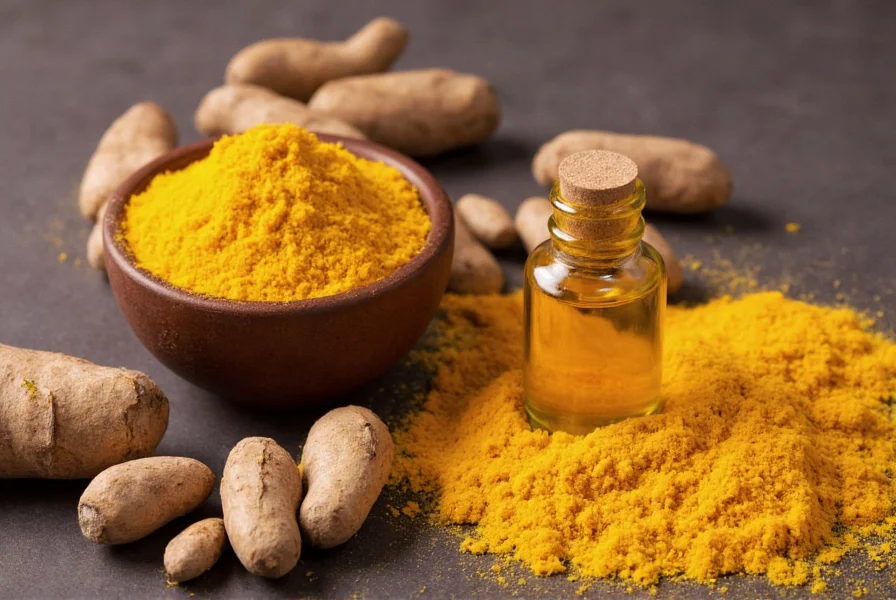The most effective oils for enhancing turmeric absorption are those containing healthy fats, particularly medium-chain triglycerides (MCTs) and monounsaturated fats. Coconut oil, olive oil, and avocado oil significantly increase curcumin bioavailability because curcumin—the active compound in turmeric—is fat-soluble. Scientific research shows that consuming turmeric with just 3-5 grams of fat can boost absorption by up to 2,000% compared to turmeric alone.
Curcumin, the primary bioactive compound in turmeric, offers potent anti-inflammatory and antioxidant properties. However, its therapeutic potential is limited by poor bioavailability when consumed without fat. This scientific reality explains why traditional Ayurvedic and culinary practices have long combined turmeric with oils and fats.
Why Oil Matters for Turmeric Absorption
Understanding the science behind turmeric and oil synergy begins with curcumin's chemical properties. As a lipophilic (fat-loving) compound, curcumin dissolves in fats but not in water. When consumed without fat, curcumin passes through the digestive system with minimal absorption into the bloodstream.
Research published in the journal Molecular Nutrition & Food Research demonstrates that dietary fats trigger bile secretion, which emulsifies both the fat and curcumin, creating micelles that transport curcumin across the intestinal wall. Without this fat-triggered process, most curcumin remains unabsorbed.
Scientific Evidence on Fat and Curcumin Bioavailability
A landmark study in the Journal of Agricultural and Food Chemistry examined curcumin absorption with varying fat amounts. Participants consuming 20mg of curcumin with just 5g of fat showed blood levels 7-8 times higher than those consuming curcumin without fat. The study concluded that even small amounts of fat significantly enhance curcumin bioavailability.
| Oil Type | Fat Composition | Absorption Boost | Additional Benefits |
|---|---|---|---|
| Coconut oil | Medium-chain triglycerides (MCTs) | High (up to 2,000%) | Antimicrobial properties, quick energy source |
| Olive oil | Monounsaturated fats | Moderate to high | Heart-healthy fats, additional antioxidants |
| Avocado oil | Monounsaturated fats | Moderate to high | High smoke point, rich in vitamin E |
| Sesame oil | Polyunsaturated fats | Moderate | Traditional Ayurvedic pairing with turmeric |
Best Oils for Turmeric: A Comparative Analysis
Not all fats affect curcumin absorption equally. The molecular structure of different fats influences how effectively they transport curcumin through the digestive system.
Coconut Oil: The MCT Advantage
Coconut oil's medium-chain triglycerides (MCTs) provide exceptional curcumin absorption benefits. Unlike longer-chain fats, MCTs bypass normal fat metabolism and go directly to the liver, creating an ideal environment for curcumin absorption. A study in Lipids in Health and Disease found that MCT oil increased curcumin bioavailability by 169% compared to long-chain triglycerides.

Olive Oil: The Mediterranean Approach
Extra virgin olive oil, rich in monounsaturated fats and polyphenols, creates a synergistic effect with turcumin. Research in the European Journal of Nutrition demonstrated that the combination of olive oil phenols and curcumin produced greater anti-inflammatory effects than either compound alone. The recommended ratio is 1 teaspoon of turmeric to 1 tablespoon of olive oil.
Avocado Oil: High-Temperature Stability
Avocado oil's high smoke point (520°F/270°C) makes it ideal for cooking with turmeric. Unlike many oils that degrade at high temperatures, avocado oil maintains its beneficial properties while enhancing curcumin absorption. A study in Food Chemistry showed that heating turmeric in avocado oil preserved 95% of curcumin content compared to 70% in lower smoke point oils.
Practical Applications: How to Use Turmeric with Oil
Understanding the science is valuable, but practical application matters most. Here are evidence-based recommendations for maximizing turmeric benefits:
Culinary Combinations
Traditional Indian cuisine provides excellent models for turmeric-oil pairing. The practice of tempering—heating spices in oil before adding other ingredients—significantly increases curcumin bioavailability. For home cooking:
- Heat 1 tablespoon of coconut or olive oil in a pan
- Add 1 teaspoon of turmeric powder and sauté for 1-2 minutes
- Proceed with your recipe, adding other ingredients
Daily Dosage Guidelines
Research suggests consuming 500-2,000mg of curcumin daily for therapeutic benefits. Since one teaspoon of turmeric powder contains approximately 200mg of curcumin, you would need:
- 1/4 to 1 teaspoon of turmeric powder with adequate fat for general wellness
- 1-2 teaspoons with fat for targeted therapeutic benefits
- Always pair with 3-5 grams of fat (about 1/2 to 1 teaspoon of oil)
Common Misconceptions About Turmeric and Oil
Several myths persist about turmeric absorption that deserve clarification:
Myth: All Fats Work Equally Well
While any fat improves absorption compared to none, research shows medium-chain triglycerides (coconut oil) and monounsaturated fats (olive, avocado) outperform saturated animal fats and polyunsaturated vegetable oils for curcumin absorption.
Myth: More Oil Always Means Better Absorption
Studies indicate diminishing returns beyond 5 grams of fat per serving. Excessive fat doesn't further increase absorption and may contribute unnecessary calories.
Myth: Heating Destroys Turmeric's Benefits
Controlled heating actually enhances curcumin solubility. Research in Food Science & Nutrition found that gentle heating (up to 180°C/356°F) for short periods increases curcumin's bioavailability without significant degradation.

Safety Considerations and Interactions
Turmeric is generally safe when consumed in culinary amounts, but higher therapeutic doses require consideration:
- Consult your healthcare provider before using therapeutic doses if you take blood thinners
- Avoid high doses if you have gallbladder issues
- Discontinue use at least two weeks before scheduled surgery
- Pregnant women should stick to culinary amounts rather than therapeutic doses
The combination of turmeric with oil doesn't create new safety concerns beyond those associated with turmeric itself. However, the enhanced absorption means potential side effects could be more pronounced at high doses.
Conclusion: Optimizing Your Turmeric Routine
The scientific evidence is clear: pairing turmeric with healthy fats dramatically increases its bioavailability and potential health benefits. Coconut oil, olive oil, and avocado oil represent the most effective options based on current research. For optimal results, heat turmeric gently in oil before consumption, use appropriate fat-to-turmeric ratios, and consider combining with black pepper (which contains piperine) for additional absorption enhancement.
Remember that consistency matters more than perfection. Regular consumption of turmeric with even modest amounts of healthy fat provides significant benefits compared to sporadic use or consumption without fat. By understanding the science behind turmeric and oil synergy, you can make informed choices that maximize the potential health benefits of this ancient spice.
What's the minimum amount of oil needed for turmeric absorption?
Research shows that just 3-5 grams of fat (approximately 1/2 to 1 teaspoon of oil) significantly enhances curcumin absorption. Consuming turmeric with less than this amount provides minimal absorption benefits, while amounts beyond 5 grams offer diminishing returns.
Can I use butter instead of oil with turmeric?
Yes, butter can enhance turmeric absorption as it contains fat, but it's less effective than oils rich in medium-chain or monounsaturated fats. Butter contains only about 80% fat (with the rest being water and milk solids), so you'd need slightly more than oil to achieve similar absorption benefits. Ghee (clarified butter) works better than regular butter as it's nearly 100% fat.
Does the type of turmeric affect which oil works best?
Fresh turmeric root and powdered turmeric both benefit from fat pairing, though powdered turmeric generally has higher curcumin concentration. The same oil principles apply to both forms. Some research suggests that fresh turmeric may have additional compounds that work synergistically with certain oils, but the fundamental absorption mechanism remains the same.
How long should I heat turmeric in oil for maximum benefits?
Gentle heating for 1-2 minutes is sufficient to enhance curcumin solubility without degradation. A study in Food Chemistry found that heating turmeric in oil at 150°C (302°F) for 2 minutes increased bioavailability while preserving over 95% of curcumin content. Longer heating times or higher temperatures may begin to degrade curcumin.
Can I take turmeric supplements with oil instead of food?
Yes, taking turmeric supplements with a small amount of oil (1/2 teaspoon) or a healthy fat source like avocado can significantly improve absorption. Many high-quality curcumin supplements already include piperine (from black pepper) or lipids to enhance bioavailability, but adding dietary fat provides additional absorption benefits.
Frequently Asked Questions
What's the minimum amount of oil needed for turmeric absorption?
Research shows that just 3-5 grams of fat (approximately 1/2 to 1 teaspoon of oil) significantly enhances curcumin absorption. Consuming turmeric with less than this amount provides minimal absorption benefits, while amounts beyond 5 grams offer diminishing returns.
Can I use butter instead of oil with turmeric?
Yes, butter can enhance turmeric absorption as it contains fat, but it's less effective than oils rich in medium-chain or monounsaturated fats. Butter contains only about 80% fat (with the rest being water and milk solids), so you'd need slightly more than oil to achieve similar absorption benefits. Ghee (clarified butter) works better than regular butter as it's nearly 100% fat.
Does the type of turmeric affect which oil works best?
Fresh turmeric root and powdered turmeric both benefit from fat pairing, though powdered turmeric generally has higher curcumin concentration. The same oil principles apply to both forms. Some research suggests that fresh turmeric may have additional compounds that work synergistically with certain oils, but the fundamental absorption mechanism remains the same.
How long should I heat turmeric in oil for maximum benefits?
Gentle heating for 1-2 minutes is sufficient to enhance curcumin solubility without degradation. A study in Food Chemistry found that heating turmeric in oil at 150°C (302°F) for 2 minutes increased bioavailability while preserving over 95% of curcumin content. Longer heating times or higher temperatures may begin to degrade curcumin.
Can I take turmeric supplements with oil instead of food?
Yes, taking turmeric supplements with a small amount of oil (1/2 teaspoon) or a healthy fat source like avocado can significantly improve absorption. Many high-quality curcumin supplements already include piperine (from black pepper) or lipids to enhance bioavailability, but adding dietary fat provides additional absorption benefits.











 浙公网安备
33010002000092号
浙公网安备
33010002000092号 浙B2-20120091-4
浙B2-20120091-4